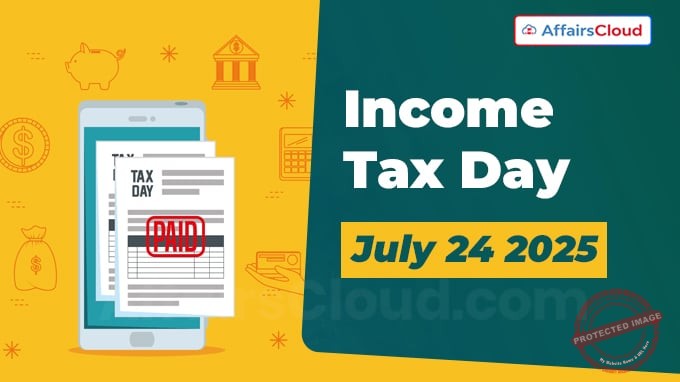
Income Tax Day, also known as Aaykar Diwas, is annually observed across India on 24 July to commemorate the introduction of Income Tax (IT) in India in 1860 by Sir James Wilson.
- The day highlights the evolution of India’s tax system, its role in national development, and the contributions of Income Tax Department (ITD) employees.
- 24 July 2025 marks the 166th anniversary of IT Day.
Background:
In 2010, the Government of India (GoI) officially designated 24 July as Income Tax Day to honour the 150th anniversary of the introduction of the IT system in India.
What is Income Tax (IT)?
Definition: IT is a direct government levy on income earned by individuals and businesses during a financial year.
Legal Basis: Under Section 2(24) of the Income Tax Act, 1961, “income” includes various sources such as:
- Income from Salary, House property, Business or profession earnings, Capital gains and Other sources (interest, dividends, winnings).
Evolution of the Income Tax (IT) System in India:
Origin: The IT system was first introduced in 1860 by Sir James Wilson, the first Finance Member of the British India Council, to address the financial crisis following the First War of Independence (1857).
First Structured Law: This initial measure laid the groundwork for the Income-tax Act of 1922, which established a structured and centralised tax administration in India by formalising various IT authorities.
Framework :The Central Board of Revenue Act, 1924, institutionalised the framework further by appointing Commissioners of IT across provinces.
- The Income Tax Act, 1961, enacted by the Parliament of India, replaced the 1922 Act and continues to serve as the comprehensive legal framework for direct taxation in India.
- Technological reforms in tax administration began with computerisation in 1981, followed by the launch of the Centralised Processing Centre (CPC) in Bengaluru(Karnataka) in 2009 to streamline return processing and improve efficiency.
India’s Tax Collections:
Net Direct Tax: As of July 10 2025, Net direct tax collection amounted to Rs. 5.63 lakh crore, a decline of 1.34% YoY from Rs. 5.70 lakh crore in FY25.
- The decline in net collection is attributed to a 38% surge in refunds, crossing Rs. 1 lakh crore, reflecting the government’s focus on faster refund processing.
Gross Direct Tax: Despite the decline in net figures, Gross Direct Tax collection rose by 3.17% YoY to Rs. 6.65 lakh crore.
Income Tax Return (ITR) Filings: Over the past five years, ITR filings have increased by 36%, with approximately 9.19 crore returns (including updated ITRs) filed in FY25, compared to 6.72 crore in FY21.
Direct Tax Collections:
India’s Gross Direct Tax Collections have shown strong and consistent growth over the past five Financial Years (FY).
- In FY 2020–21, despite the impact of the COVID-19 pandemic, gross direct tax collections stood at Rs. 12.31 lakh crore.
- The collections increased to Rs. 16.34 lakh crore in FY 2021–22, showing signs of recovery.
- The growth continued in FY 2022–23 and FY 2023–24, with collections reaching Rs. 19.72 lakh crore and Rs. 23.38 lakh crore, respectively.
- In FY 2024–25, gross direct tax collections rose further to Rs. 27.02 lakh crore (provisional, as of March 31, 2025).
Union Budget 2025–26: Revised Tax Slabs Under New Regime
The new tax rates are as follows:
- Income up to Rs 4 lakh – Nil
- Rs 4–8 lakhs – 5%
- Rs 8–12 lakhs – 10%
- Rs 12–16 lakhs – 15%
- Rs 16–20 lakhs – 20%
- Rs 20–24 lakhs – 25%
- Above Rs 24 lakhs – 30%
- No tax for individuals earning up to Rs 12 lakhs.
- Salaried individuals earning up to Rs 12.75 lakhs annually will pay no tax due to a standard deduction of Rs 75,000.
Notable Initiatives – Union Budget 2025–26
Rationalisation of (Tax Deducted at Source) / TCS (Tax Collected at Source) Provisions:
- The TDS limit on interest income for senior citizens has been increased from Rs. 50,000 to Rs. 1 lakh.
- The TDS threshold on rent payments has been raised from Rs. 2.4 lakh to Rs. 6 lakh per annum.
- The TCS threshold under the Liberalized Remittance Scheme (LRS) has been revised upward from Rs. 7 lakh to Rs. 10 lakh.
- Delay in TCS payments has been decriminalized, promoting ease of doing business.
Promoting Voluntary Tax Compliance:
- Withdrawals from National Savings Scheme (NSS) accounts made on or after August 29, 2024, are now fully exempt from income tax for individuals.
- Tax deduction benefits have been introduced for contributions to NPS Vatsalya accounts under the old tax regime.
Simplifying Tax Compliance:
- The time limit for filing updated income tax returns has been extended from 2 years to 4 years.
- The validity period for registration of small charitable trusts and institutions has been increased from 5 years to 10 years.
- Taxpayers are now allowed to claim exemption on the annual value of 2 self-occupied properties (previously limited to one), without any conditions.
Income Tax Bill, 2025 – Towards Simplified Taxation
The Income Tax Bill, 2025 proposed to replace the Income Tax Act, 1961, retaining its core provisions but simplifying language, removing outdated sections, and enhancing clarity in line with Viksit Bharat objectives.
About Central Board of Direct Taxes (CBDT):
The CBDT, the apex body for direct tax administration under the Department of Revenue, Ministry of Finance (MoF), Government of India (GoI).
Chairman – Ravi Agarwal
Headquarters – New Delhi, Delhi
Motto – Fund roots and bars
Established – 1964




